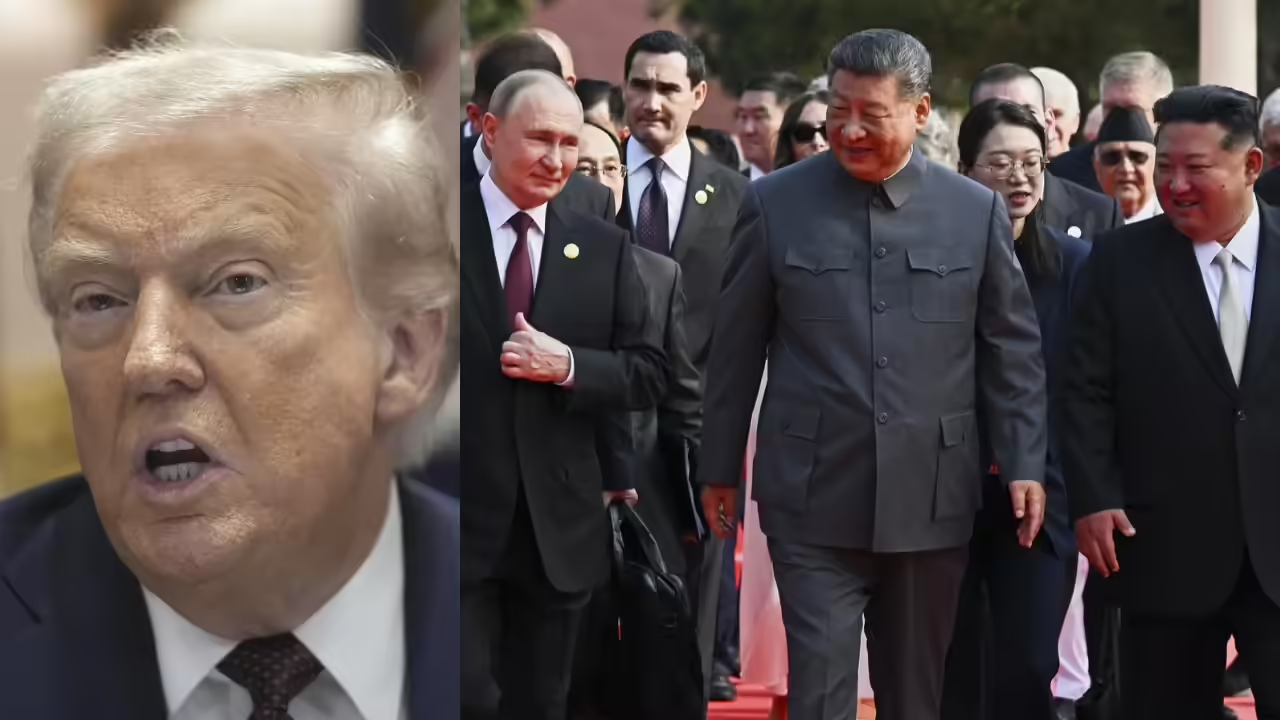
Former U.S. President Donald Trump has reignited tensions with China, launching a fiery accusation against Chinese President Xi Jinping. Speaking at a rally in front of thousands of supporters, Trump claimed that Beijing is secretly “conspiring against the United States” and using global displays of military power to undermine America’s influence.
His remarks came shortly after China’s military parade stunned the world, featuring some of the nation’s most advanced missile systems, drones, and futuristic defense technologies. The parade, widely covered by international media, has been interpreted by many analysts as both a show of strength and a subtle warning to Washington and its allies.
Trump’s Fiery Accusations Against Xi
During his speech, Trump described Xi’s actions as a calculated move aimed at weakening America’s role as the global leader.
“Xi is not just showing off tanks and missiles. He’s sending a message to the world — that he wants to replace the United States as the most powerful nation on Earth,” Trump said, drawing loud applause from his supporters.
He went further, suggesting that China is not only challenging the U.S. economically but also attempting to sabotage its security alliances. According to Trump, Beijing’s influence stretches from trade wars to cyber warfare and even covert global partnerships.
China’s Parade: A Symbol of Power
The parade itself was nothing short of spectacular. Held in Beijing, it featured thousands of troops marching in precise formation, accompanied by an arsenal of new-age weaponry. Among the highlights were:
- Hypersonic missiles capable of traveling at speeds that make them nearly impossible to intercept.
- Unmanned aerial combat drones, showcasing China’s advancements in AI-driven warfare.
- Next-generation tanks and armored vehicles, emphasizing mobility and firepower.
- Space and cyber warfare units, symbolizing China’s focus on modern combat strategies.
Chinese state media described the event as a celebration of national pride and peaceful development. However, critics argue that the timing and scale of the parade were strategic — a direct signal to the West, especially the United States.
A Deepening U.S.–China Rivalry
Relations between Washington and Beijing have already been strained for years, with disputes ranging across trade, technology, and geopolitics. From the South China Sea to Taiwan, both nations are vying for dominance in the Indo-Pacific region.
Trump, known for his tough stance on China during his presidency, framed the parade as evidence of Beijing’s long-term ambitions. “They’re not just building weapons for defense. They’re preparing to challenge us on every level — militarily, economically, and politically,” he said.
Global Reactions: Awe and Concern
While Trump’s comments stirred political debate in the U.S., global leaders and analysts were more measured in their responses. Many acknowledged that China’s display of strength was impressive but also troubling.
- Military analysts called it a clear sign that China is narrowing the technological gap with the U.S.
- European officials expressed concern that the parade reflected a push for greater global influence.
- Asian allies such as Japan and South Korea are expected to increase defense coordination with Washington in response.
The global message was unmistakable: China wants to be seen as a military superpower capable of standing shoulder-to-shoulder with the United States.
Trump’s Strategy or Political Posturing?
Some observers believe Trump’s remarks were not just about foreign policy but also domestic politics. With the U.S. heading toward another heated election cycle, Trump may be leveraging anti-China rhetoric to energize his base.
Analysts point out that framing Xi and China as adversaries allows Trump to position himself as a strong defender of American interests — a strategy he used effectively during his 2016 campaign.
What’s Next for U.S.–China Relations?
The confrontation between Washington and Beijing shows no signs of easing. The U.S. continues to expand its defense ties with allies like India, Japan, and Australia through the Quad alliance, while China is doubling down on its Belt and Road Initiative and military modernization.
If Trump returns to the White House, his latest remarks suggest an even tougher stance against China. For now, his fiery accusations have once again thrust the U.S.–China rivalry into the global spotlight, with the world watching closely as the two superpowers edge toward deeper confrontation.
Conclusion
Trump’s accusation that Xi is conspiring against the U.S. may sound dramatic, but it underscores the deep mistrust and rivalry defining 21st-century geopolitics. China’s military parade may have been designed to boost national pride, yet it has sent a strong signal far beyond Beijing.
As the world digests both the spectacle of China’s show of strength and Trump’s inflammatory response, one thing is clear: the U.S.–China struggle for global dominance is intensifying, and the stakes have never been higher.



